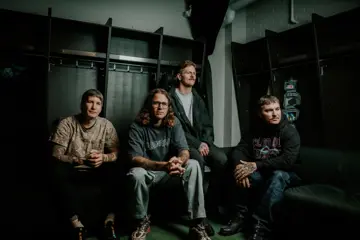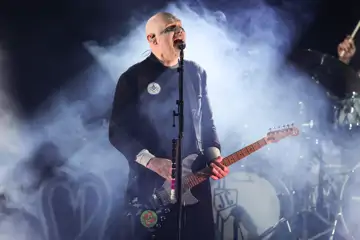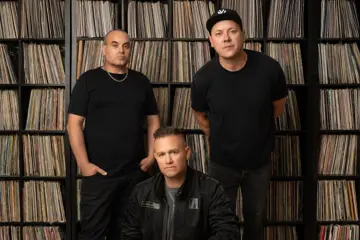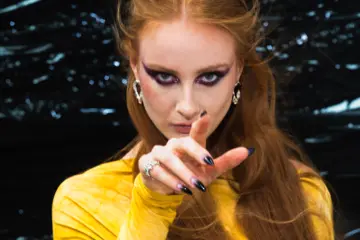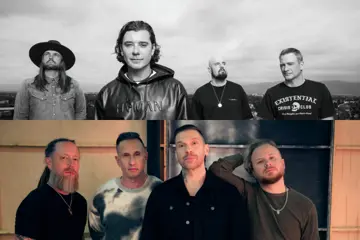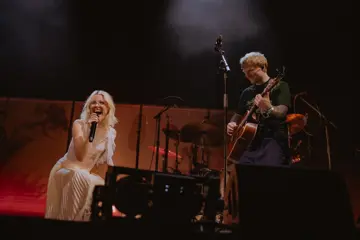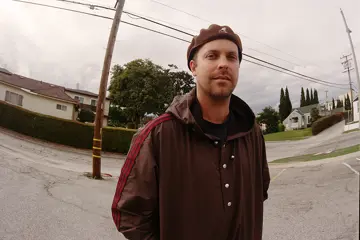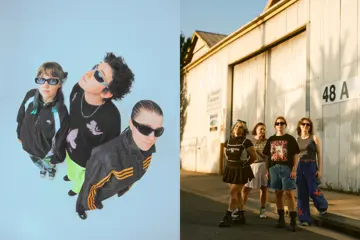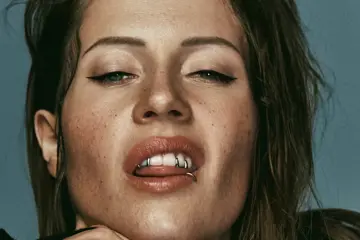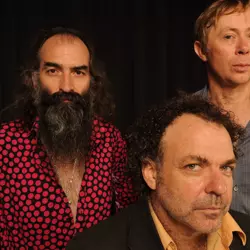 Dirty Three
Dirty ThreeUntil recently iconic expat musician Warren Ellis was probably too busy to worry about anything bordering on existentialism. Even by his own prolific standards Ellis – who moved to Paris in the late-‘90s, where he still abides (when not on tour) with his French wife and two children – has been particularly hectic of late. In recent years he has completed a Nick Cave & The Bad Seeds’ album (2013’s Push The Sky Way) – having long ago worked his way up that band’s ranks to become Cave’s trusted musical lieutenant – plus the numerous subsequent tours around the world with that gang, as well as consolidating his burgeoning reputation (in partnership with Cave) for composing film scores, the pair having knocked off some five soundtracks since 2012 with plenty more irons currently in that particular fire.
Plus he’s about to re-join his bandmates Mick Turner (guitar) and Jim White (drums) in their celebrated instrumental outfit Dirty Three, who have released eight acclaimed albums of cinematic melancholia since forming in Melbourne back in 1992, and are on the verge of playing their first show in a few years together at the 2016 Sydney Festival.
Only when The Music catches up with Ellis it’s in the direct aftermath of the horrific terrorist atrocities which rocked his adopted homeland last November. Not only is Ellis inextricably linked to those appalling events by proximity, but due to his musical friendships he was a single sliding door's decision away from actually attending his friends’ Eagles Of Death Metal gig at the Bataclan Theatre on 13 November, the night when 89 of the gig goers would never get to leave the venue alive. And he would have had his children with him.
"I went to the venue two days afterwards to put some flowers there and people were out but there was a very different feeling in the air..."
“It’s very strange, very strange,” he offers forlornly of the mood in Paris post-attacks. “It’s very different to after the first one with Charlie Hebdo, after that one there was a sort of feeling of defiance – there was a big demonstration and stuff, and you could feel that people were kind of defiant about it and indignant about the whole thing. It was like, ‘How dare you?’ This time it felt like there was definitely a feeling of exhaustion. I went to the venue two days afterwards to put some flowers there and people were out but there was a very different feeling in the air, just the fact that it was such a vicious attack on an unnecessary target. I mean no targets are necessary, Charlie Hebdo was so uncalled for, but there was some perverted kind of thinking that because you could publish these pictures [of Mohammed] then you were fair target and stuff like that – but this was just so heinous this attack.
Don't miss a beat with our FREE daily newsletter
“I dunno, my friend Josh [Homme] from Queens Of The Stone Age, he plays with [Eagles Of Death Metal] and he’d been on tour with them and I’d seen them on the tour a month before, and I was in the studio with [producer Nick] Launay and we were meant to go to the [Bataclan] show – I was going to get a bunch of tickets for my kids and their friends but Josh wasn’t there so I decided not to go and went to a circus instead with a bunch of people who were meant to be going to that show, so it was very strange to be sitting there as [news] filtered in and not knowing if they were going to take… what was going on. So it was very strange to be sitting in a kind of circus with everybody on their iPhones, huddled over their phones trying to work out what was going on. It was very strange actually.
“Now my kids at school are conducting terrorist drills, like what to do – we had a letter and were told that some kids might be traumatised. They do these things that are the opposite to a fire alarm where you kind of have to back up against the wall that the door is facing – turn the lights off, close the door and not make a noise for 40 minutes while people walk around and try to open the doors. That’s what’s going on in my kid’s school – it’s a very strange time. It’s a very strange time, but life is going on – I did a show the other night, which was great. I’d been over doing a soundtrack in the UK – I went over for a few days and took the Eurostar [railway] over – and I came back and had been asked to do a show with Marianne Faithfull, and I got back just in time to be able to run in and do a couple of songs with her.
"I decided not to go and went to a circus instead with a bunch of people who were meant to be going to that show."
“I guess it was four days after [the terrorist attack], but it felt important because it was the first opportunity to get up and do something – it felt important to play a show. And then I did one with Patti Smith and Flea and Thom Yorke the other night for global warming – for the Climate Summit for the 350.org, Flea asked me if I would come and play with him so I did that. We all got up and played People Have The Power and stuff like that. Patti Smith was amazing because she has this incredible kind of grace and generosity and so much love was coming out of her and so much sadness for what had happened, and it was great to be in this venue packed with people in a kind of place like where all of those people got killed. It actually felt very meaningful to be there. Yeah, it’s very strange here at the moment actually, I must say. It feels strange everywhere – it’s strange times unfortunately.”
Even just hearing from afar how close Ellis and his family were to becoming embroiled in the terrorism is horrifying, but the man himself seems relatively unperturbed.
“It’s just life, you know,” he ponders. “That’s the thing, that’s what’s the terrible thing about it, that anyone could have been there. My friend’s kids go and drink coffee in that area, it’s like a little area for my kids and their friends who are 15 and 16 where you can sit and have a coffee and things like that. And they were around our house the next day and that’s what the kids were talking about – ‘we go to those cafes and drink’, you know?
“So it really resonated with everybody that you could have been there. You could have been there quite easily but for a kind of… luck? And I guess that’s the intention of it too. It makes you realise that anybody is fair game. It’s very strange and sad times here, but also people are getting on with things, and now with these recent elections and now that the extreme right have got a lot more votes in the preliminary and stuff like that… it’s very strange times here, yeah.”
It does make his impending Dirty Three return seem more appealing, some creative respite with two close friends whom he’s known for decades but doesn’t get to spend much time with these days.
“It’s great, it’s really good news,” he enthuses gently. “It was interesting, I did that show with Flea and it kind of reminded me of when we first started with the Dirty Three – something about the spirit of it. He just sort of emailed me one tune and also this Phil Cohran piece – this kind of jam thing, this really beautiful piece – and there was something not unlike [1995 Dirty Three track] Indian Love Song or something, where we just kind of got on this thing and went for it, and it just suddenly felt like I was 25 years younger and standing there looking over at Flea sort of just going bananas! He just said to me, ‘Look, do you want to come along and play? I want to do something like [1971 Funkadelic album] Maggot Brain’, and I’m, like, ‘Fuck, I’m there man!’ So there was something very fabulous about it – it was just like ‘tits out and away you go’. It was really heartening, and it also halfway through reminded me of sitting in a garage somewhere with Mick and Jim bashing out a song. Everybody was just hanging on and holding onto a really simple thread of music, just like cranking it up louder and louder. It actually made me feel very happy that we’re doing these [Dirty Three] shows.”
The music of Dirty Three is wild and sprawling, with all three protagonists complete masters of their chosen domain. To see them in the flesh is an utterly visceral experience – a natural blend of melancholy and theatrics, captivating and emotive in equal measure – and Ellis attests that the innate chemistry between the three returns with little fuss or bother.
"There was something very fabulous about it – it was just like ‘tits out and away you go’."
“Yeah,” he smiles. “We’re all busy doing things – Jim is off now touring somewhere around Europe I believe with George Xylouris, and I think Mick has been playing or he’s painting or something. And I’ve been kind of working since 2013 with Push The Sky Away and with Nick solo and stuff like that, and I’ve done a bunch of soundtracks as well. Even when you’re not doing that and you’re doing other work, as long as you’re working you’re keeping some kind of thread of the narrative hopefully flowing along. There’s something to be said I guess for spending a good part of the ‘90s driving around in a van playing six or seven shows a week for ten months a year. Anyway, we’ll see.”
Ellis doesn’t believe that he needs to adopt a different mindset when he returns to the Dirty Three fold, seeing all of his pursuits as being different threads of the same tapestry.
“Well it’s been a while with [me playing with] Nick now – it’s been around 20 years – so with me these days you’re talking in terms of decades it would seem,” he continues. “I never demarcated between things, although I realised I do different things – when I’m doing a score it’s a different thing, and playing with Dirty Three is a different thing. There’s something similar about everything and then there’s differences. Doing a score permits me to explore another area of what I do.
“I’ve just done a mass for a film on Django Reinhardt with pipe organs, strings and a choir which will be sung in Romanian – I just finished that up a couple of days ago. We just did the demo for that and it’s sounding very interesting – it’s something very different to what I’ve ever done, and that will be recorded in a church somewhere, it’s a major part of this film. I like the fact that I’ve somehow managed to eke my way into different areas like soundtracks and the work with Nick and that, because it sort of pushes me to other places.
“Music was always about that for me, to hopefully try and keep exploring things so that it doesn’t stay static. I think it’s certainly added to the longevity of the Dirty Three in particular, because we’ve all managed to go off and do different things and come back, and always seen that as a good thing – that we all do different things, and that we’re not married in a way, or monogamous. It’s always felt like it was the way that the band needed to be too, because as a sole full-time concern it almost felt like it was too much to do – you need to have time away.
“I dunno, I’ve always loved doing different things – like the soundtrack stuff is very challenging, and it’s different challenges and different rules and you’re serving something else and it doesn’t have that same sort of self-centred thing that a group has. The Bad Seeds has always been an interesting challenge to me to see where I fit in within that group that was established for years before I came along, and roles change within that band and my relationship has changed working with Nick over the years. We’ve done some things like Grinderman together and a bunch of scores now, and it continues to be a relationship that’s productive and I find that really interesting. If it wasn’t I wouldn’t find it interesting.
“For me the music has always been about being productive and taking risks."
“For me the music has always been about being productive and taking risks, and I hope in some way that I’ve been able to do that. And I’m not trying to be facetious or anything like that, it’s always just been a hope – or drive – for me. There was really not much else that ever drove me, just the fact that I love making music and it’s always been something that I like watching evolve. And also trying to find a new way into the same thing, if you know what I mean.”
Dirty Three’s music may seem off-the-cuff at times when you see the three of them together feeling and interacting with the music, but Ellis explains that while it’s encouraged in reality there’s only marginal room for improvisation. “There is some in most instances – there is a basic structure and if you know the songs then you’ll recognise them, because we’re not a jazz band or a freeform jazz band,” he laughs. “We probably operate more in the way that people did up to sort of freeform jazz, where they would have a standard of a tune and people would go off within that and do their thing – we kind of do that, but we come from a rock sensibility so it’s much more marginalised what we do. It’s more held back, but there’s always room for things to change. Playing regularly things get into a certain way of working and you get a structure – it’s kind of inevitable really, that’s just what happens – but they’re loosely improvised and also there’s loosely a structure. There’s enough leeway in there for it to fall apart at any moment, which is what’s exciting about it.
“The Dirty Three was never a band where the idea was to get a bunch of songs that we play night after night in the same way and that kind of thing, it was always about moving away from that. We didn’t have a singer for practical reasons because nobody sang, but also we weren’t interested in getting on either because it seemed to limit our possibilities as players. So there was always a given understanding about what we were doing, even if we didn’t talk about it with the three of us there were always certain things that as soon as we started playing together it afforded us certain creative moves that weren’t possible in groups that had a singer.”
And whilst no vocals means that they have to be more creative in conveying emotion, Ellis doesn’t find the instrumental format limiting in any way, shape or form.
“It’s only as limiting as it can be with having [a singer],” he tells. “I mean Miles Davis didn’t have a vocalist in his band, and that didn’t stop him from having 100 records. It’s only as limiting as you make it. The limiting thing is the number of people – we’ve never expanded the band in order to expand the sound and kind of take us elsewhere, it’s always been interesting amidst the constraints of the three of us to see what we can do, with what we can do with the instruments that we have at our disposal and how we can use the studio.
"We’re all trying to find a new way in to something that’s not new.”
“That’s proven to be limiting, and it’s proven to also be a strength I think in that it’s kind of set our parameters for us to work within. That’s always a challenge.
"I’ve never written a song in my life lyrically so I don’t know, but I would imagine that that has the same limitations too – if you think there are limitations. We have the same notes that exist and we try to put them in some kind of order that feels vaguely original but which we all know that they’re not. We’re all trying to find a new way in to something that’s not new.”
So with that in mind where do Dirty Three songs actually come from? Ellis explains that they inevitably arise when the three bandmates are in the same room together.
“It always has to be with us together,” he admits. “We bring ideas together, but we always have to be there – it doesn’t seem to work with just one of us. You can get an idea, but that idea comes into shape when the three of us start playing. It’s always been about the three of us sitting there – even if you’ve got a couple of chords or a melody, it always changes.
“The Dirty Three has always been the sum of its parts – it’s always felt that if somebody left then that would be the end of the group, because it is the sum of its parts that outfit, And hopefully this getting together with afford us some time too to work on some new material. I’ve made a lot of new material in the last few years since we did a Dirty Three record [2012’s Toward The Low Sun], but I don’t specifically have any ideas for a Dirty Three tune, but hopefully that will come when we get together and start playing together again. That’s always been one of the most exhilarating things about the Dirty Three, that when they come together they come together very quickly.”



